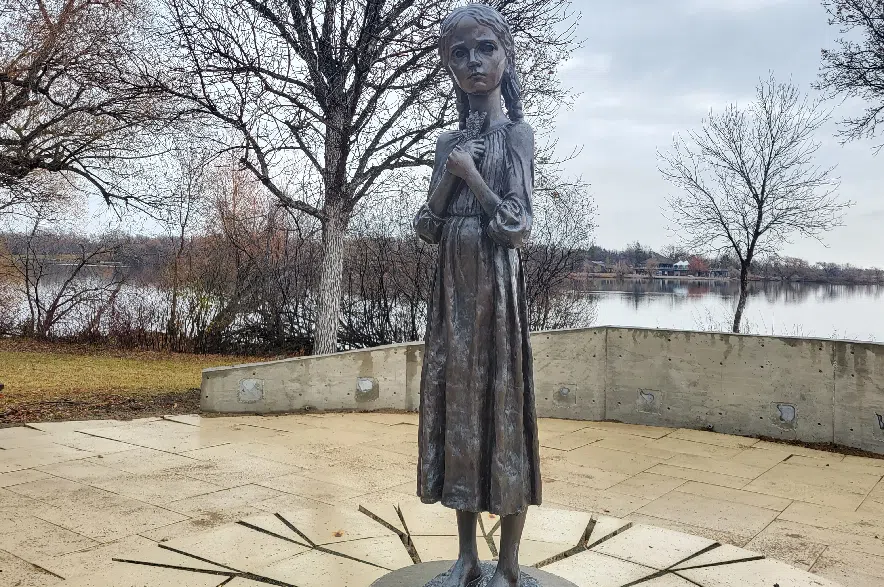The Government of Saskatchewan welcomed members of the province’s Ukrainian community to help commemorate victims of the 1932-1933 Ukrainian famine, often referred to as the Holodomor.
A special service was held at the Legislative Building in Regina on Tuesday in honour of those who died and suffered through the famine. Saskatchewan has been commemorating the event since 2008.
Read more:
- $50,000 for Holodomor Monument as Ukrainians remember war anniversary
- 91st anniversary of Ukraine Holodomor famine remembered in Saskatchewan
- Ukraine’s army chief visits besieged city as Zelenskyy confronts graft scandal
Jamie Martens, MLA for Martensville-Blairemore, emphasized Saskatchewan’s close connections to Ukraine.
“In addition to honouring those who lost their lives, we recognize the resilience of those who endured unimaginable suffering and survived. Many of these survivors found refuge in Saskatchewan, where they rebuilt their lives and laid the foundations for a brighter future. And today, approximately 13 per cent of Saskatchewan residents trace their ancestry back to Ukraine,” Martens said during a speech on Tuesday.
“While time has passed, please know that the victims and survivors have not and will not be forgotten. Today, we stand alongside our fellow citizens of Ukrainian heritage to honour the memory of those who have endured the unimaginable. In doing so, we ensure that their stories live on in the hearts and minds of all of us.”
A candlelight ceremony was held during the service, conducted in concert with similar ceremonies in Ukraine and around the world.
In 2015, the Wascana Centre unveiled a replica of a statue created by sculptor Preto Drozdowsky called “Bitter Memories of Childhood” to memorialize the Holodomor. It’s located southeast of the Legislative Building on Lakeshore Drive, while the original is located in the Ukrainian capital of Kyiv.
Today at the Legislative Building, we joined Saskatchewan’s Ukrainian community to honour the millions of innocent lives lost during the Holodomor famine of 1932-33.
— Scott Moe (@PremierScottMoe) November 18, 2025
As the memorial candle burns throughout Holodomor Memorial Week, we stand in solidarity with Ukrainian people… pic.twitter.com/0juh98bS0U
“More than nine decades have passed, yet the memory of Holodomor remains etched in the soul of Ukrainian people,” Martens added in a statement.
“Across Saskatchewan, and around the world, Ukrainian descendants and members of the wider public come together to commemorate Holodomor, honouring the millions who suffered and perished during one of history’s darkest chapters.”
In February, the Provincial Capital Commission announced that it would spend $50,000 to restore the monument.
“As the memorial candle burns throughout Holodomor Memorial Week, we stand in solidarity with Ukrainian people here at home and around the world—remembering a horrific, man-made tragedy and ensuring its lessons are never forgotten,” Premier Scott Moe said in a post on social media.
“Saskatchewan was the first jurisdiction in North America to formally recognize the Holodomor as genocide, and the monument in Wascana Centre remains a lasting tribute to those who suffered. We will always remember.”











